Kidnapped - Robert Louis Stevenson (the gingerbread man read aloud TXT) 📗

- Author: Robert Louis Stevenson
Book online «Kidnapped - Robert Louis Stevenson (the gingerbread man read aloud TXT) 📗». Author Robert Louis Stevenson
“Captain,” says Alan, “if ye see a pennant, it shall be your part to run away. And now, as I hear you’re a little short of brandy in the forepart, I’ll offer ye a change: a bottle of brandy against two buckets of water.”
That was the last clause of the treaty, and was duly executed on both sides; so that Alan and I could at last wash out the roundhouse and be quit of the memorials of those whom we had slain, and the captain and Mr. Riach could be happy again in their own way, the name of which was drink.
XII I Hear of the “Red Fox”Before we had done cleaning out the roundhouse, a breeze sprang up from a little to the east of north. This blew off the rain and brought out the sun.
And here I must explain; and the reader would do well to look at a map. On the day when the fog fell and we ran down Alan’s boat, we had been running through the Little Minch. At dawn after the battle, we lay becalmed to the east of the Isle of Canna or between that and Isle Eriska in the chain of the Long Island. Now to get from there to the Linnhe Loch, the straight course was through the narrows of the Sound of Mull. But the captain had no chart; he was afraid to trust his brig so deep among the islands; and the wind serving well, he preferred to go by west of Tiree and come up under the southern coast of the great Isle of Mull.
All day the breeze held in the same point, and rather freshened than died down; and towards afternoon, a swell began to set in from round the outer Hebrides. Our course, to go round about the inner isles, was to the west of south, so that at first we had this swell upon our beam, and were much rolled about. But after nightfall, when we had turned the end of Tiree and began to head more to the east, the sea came right astern.
Meanwhile, the early part of the day, before the swell came up, was very pleasant; sailing, as we were, in a bright sunshine and with many mountainous islands upon different sides. Alan and I sat in the roundhouse with the doors open on each side (the wind being straight astern), and smoked a pipe or two of the captain’s fine tobacco. It was at this time we heard each other’s stories, which was the more important to me, as I gained some knowledge of that wild Highland country on which I was so soon to land. In those days, so close on the back of the great rebellion, it was needful a man should know what he was doing when he went upon the heather.
It was I that showed the example, telling him all my misfortune; which he heard with great good-nature. Only, when I came to mention that good friend of mine, Mr. Campbell the minister, Alan fired up and cried out that he hated all that were of that name.
“Why,” said I, “he is a man you should be proud to give your hand to.”
“I know nothing I would help a Campbell to,” says he, “unless it was a leaden bullet. I would hunt all of that name like blackcocks. If I lay dying, I would crawl upon my knees to my chamber window for a shot at one.”
“Why, Alan,” I cried, “what ails ye at the Campbells?”
“Well,” says he, “ye ken very well that I am an Appin Stewart, and the Campbells have long harried and wasted those of my name; ay, and got lands of us by treachery—but never with the sword,” he cried loudly, and with the word brought down his fist upon the table. But I paid the less attention to this, for I knew it was usually said by those who have the underhand. “There’s more than that,” he continued, “and all in the same story: lying words, lying papers, tricks fit for a peddler, and the show of what’s legal over all, to make a man the more angry.”
“You that are so wasteful of your buttons,” said I, “I can hardly think you would be a good judge of business.”
“Ah!” says he, falling again to smiling, “I got my wastefulness from the same man I got the buttons from; and that was my poor father, Duncan Stewart, grace be to him! He was the prettiest man of his kindred; and the best swordsman in the Hielands, David, and that is the same as to say, in all the world. I should ken, for it was him that taught me. He was in the Black Watch, when first it was mustered; and, like other gentlemen privates, had a gillie at his back to carry his firelock for him on the march. Well, the King, it appears, was wishful to see Hieland swordsmanship; and my father and three more were chosen out and sent to London town, to let him see it at the best. So they were had into the palace and showed the whole art of the sword for two hours at a stretch, before King George and Queen Carline, and the Butcher Cumberland, and many more of whom I havenae mind. And when they were through, the King (for all he was a rank usurper) spoke them fair and gave each man three guineas in his hand. Now, as they were going out of the palace, they had a porter’s lodge to





Comments (0)